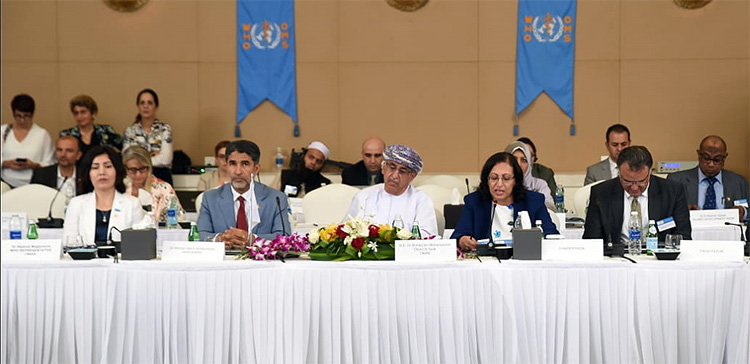
6 September 2018, Salalah, Oman – After the signing yesterday of the UHC 2030 International Health Partnership Global Compact for progress towards universal health coverage by countries of the Region, health ministers, policy-makers and experts from WHO’s Eastern Mediterranean Region and beyond today called on heads of state and governments of the Region to endorse a vision of UHC in their social, economic and health policies and develop national roadmaps to realize that vision.
In the Salalah Declaration arising from this high-level ministerial meeting, countries have reaffirmed their commitment to UHC as both a desirable and an attainable policy goal for all countries at all levels of national income, including countries affected by emergencies, and country efforts to identify health system challenges and develop policies and strategies to address the challenges were widely acknowledged by all participants of the meeting. They called on decision-takers and policy-makers in health and health-related fields to adopt the Framework for action on advancing UHC in the Eastern Mediterranean Region and to work towards implementing its associated actions. They also requested ministers of health and finance and others to develop national UHC compacts, based on the UHC2030 Global Compact, and to hold themselves accountable for implementing actions that advance progress towards UHC as per the commitments they have made.
In his closing remarks, Dr Ahmed Al-Mandhari, WHO’s Regional Director for the Eastern Mediterranean, expressed appreciation for the genuine will of all participants to progress towards UHC and to scale up the quality of health services provided. “As WHO’s Regional Director for the Eastern Mediterranean I consider myself a citizen of all countries in the Region and I assure you that I will work tirelessly with my team to realize UHC for each of my fellow citizens,” Dr Al-Mandhari stated. “UHC is a noble goal and we are determined to achieve it."
One of the key points of the Declaration is the call for health policy-makers to define a context-specific essential health service package based on globally and regionally identified UHC priority benefit packages – which take into consideration the burden of disease in each country, the country’s economic imperatives and the preferences of its people.
The situation for migrants, internally displaced persons, refugees and returnees was the focus of discussions on the last day of this historic meeting as the Region faces an unprecedented scale of emergencies. Nine countries have been graded as emergencies by the United Nations with almost 30 million out of 68.5 million displaced people, or 44% of all displaced persons globally, originating from the Region. Given the number of humanitarian emergencies, due focus must be given to the challenges of ensuring access to health care for all, including migrants and refugees, and health systems which can respond to these challenges.
“The clear cut message to the world is that the health for all is a task and a mission for everyone. Working hand in hand, and with good will, we can achieve our goal,” WHO’s Regional Director concluded.
Related links
In landmark initiative, countries of the Region sign UHC2030 Global Compact to progress towards universal health coverage
4 September 2018
Ministerial meeting paves the way for universal health coverage in the Region
28 August 2018
For more information:
WHO Regional Office for the Eastern Mediterranean:
Dr Fethiye Gülin Gedik Coordinator
Health Workforce Development
Mobile: +20 127 545 0814
E-mail:
Omid Mohit
Technical Manager
Media and Communications
Mobile: +20 106 881 3340
Email:
Mona Yassin
Communications Officer Media and Communications
Mobile: +20 100 601 9284
Email:


